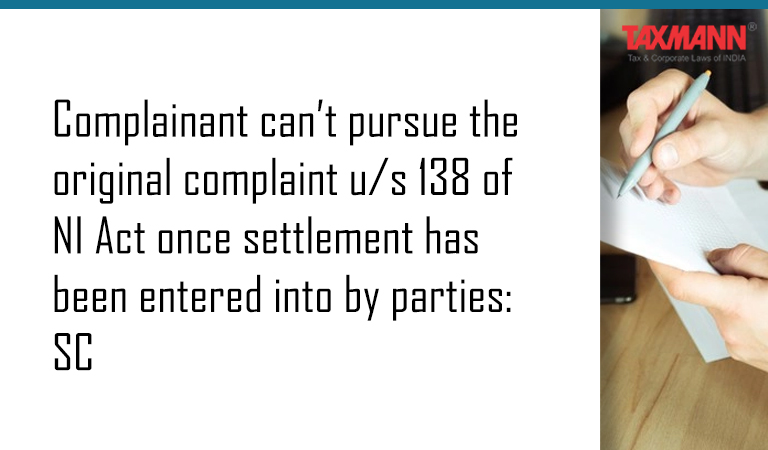Complainant can’t pursue the original complaint u/s 138 of NI Act once settlement has been entered into by parties: SC
- News|Blog|FEMA & Banking|
- 3 Min Read
- By Taxmann
- |
- Last Updated on 8 December, 2021

Case Details: Gimpex (P.) Ltd. v. Manoj Goel - [2021] 133 taxmann.com 16 (SC)
Judiciary and Counsel Details
-
- Dr. Dhananjaya Y. Chandrachud, Vikram Nath and B.V. Nagarathna, JJ.
- Karun Mehta, AOR, V. Giri, Sr. Adv., Ms. Liz Mathew, AOR, Ms. Ankita Gupta, Navneet R., Ms. Sonali Jain and Ms. Vasudha Jain, Advs. for the Appearing Parties.
Facts of the Case
In the instant case, the appellant entered into three high seas sale agreements with Aanchal Cement Limited (ACL). Though the appellant supplied the goods, ACL failed to make payments. ACL issued 18 cheques in favor of the appellant in part payment of the outstanding liability. All the cheques were dishonored upon presentation with an endorsement due to insufficient funds.
The appellant filed criminal complaints under section 138 of the NI Act, in respect of dishonor of the cheques. ACL approached the appellant to settle the matter and arrive at a compromise. According to the settlement, Rs. 3 crores were paid by a demand draft in favor of the appellant on basis of which bail was granted.
The balance amount of Rs. 7 crores were agreed to be paid by ACL within 3 months and cheques were issued by ACL in favor of the appellant towards the compliance of the settlement. The cheques issued in pursuance of the deed of compromise were, however, dishonored, leading to a second complaint by the appellant under section 138 of the NI Act.
ACL and its directors instituted proceedings for quashing the proceedings pending against them under section 138 of the NI Act under the first as well as the second set of complaints. The High Court held that since the validity of the deed of compromise had been challenged in a suit pending before the High Court, the second set of cheques issued only based on the deed of compromise could not be construed as being towards the discharge of a liability.
Supreme Court Held
On appeal, the Supreme Court observed that the Single Judge of High Court was in error in proceeding to quash the criminal complaint on a priori reasoning that the second set of cheques issued in pursuance of the deed of compromise were not in discharge of liability and on that basis proceeding to quash the proceedings.
If the compromise deed is found to be void ab initio on account of coercion, the very basis for quashing of the first complaint is removed since the settlement agreement is deemed to have never existed and hence it had no effect on the liability subsisting under the first complaint. The appellants may then approach the competent court for reinstatement of the original complaint and the trial can proceed on that basis.
Case Review
-
- Order passed by Madras High Court in CC No. 389 of 2017, dated 10-4-2019 (para 55) set aside.
- Lalit Kumar Sharma v. State of Uttar Pradesh [2010] 2 taxmann.com 99 (SC) (para 42) distinguished.
List of Cases Referred to
-
- K Bhaskaran v. Sankaran Vaidhyan Balan [1999] 7 SCC 510 (para 26)
- P. Mohanraj v. Shah Bro. Ispat (P.) Ltd. [2021] 125 taxmann.com 39/67 SCL 327 (para 27)
- Meters & Instruments (P.) Ltd. v. Kanchan Mehta [2017] 87 taxmann.com 6/144 SCL 339 (SC) (para 28)
- Prakash Gupta v. SEBI [2021] 128 taxmann.com 362/167 SCL 560 (SC) (para 29)
- Damodar S Prabhu v. Sayed Babala [2010] 101 SCL 27 (SC) (para 29)
- Expeditious Trial of Cases under section 138 of the NI Act, 1881, In re [2021] 127 taxmann.com 23/167 SCL 103 (SC) (para 32)
- R. Vijayan v. Baby [2012] 17 taxmann.com 77 (para 37)
- Lalit Kumar Sharma v. State of Uttar Pradesh [2010] 2 taxmann.com 99 (para 41)
- Arun Kumar v. Anita Mishra [2020] 113 taxmann.com 43/157 SCL 357 (SC) (para 41)
- HMT Watches Ltd. v. M.A. Abida [2015] 56 taxmann.com 328/130 SCL 511 (SC) (para 50)
- Sampelly Satyanarayana Rao v. Indian Renewable Energy Development Agency Ltd. [2016] 74 taxmann.com 68/38 SCL 73 (SC) (para 50)
- Kumar Exports v. Sharma Carpets [2011] 3 taxmann.com 57 (SC) (para 51)
- Kishan Rao v. Shankargouda [2018] 8 SCC 165 (para 52).
Disclaimer: The content/information published on the website is only for general information of the user and shall not be construed as legal advice. While the Taxmann has exercised reasonable efforts to ensure the veracity of information/content published, Taxmann shall be under no liability in any manner whatsoever for incorrect information, if any.

Taxmann Publications has a dedicated in-house Research & Editorial Team. This team consists of a team of Chartered Accountants, Company Secretaries, and Lawyers. This team works under the guidance and supervision of editor-in-chief Mr Rakesh Bhargava.
The Research and Editorial Team is responsible for developing reliable and accurate content for the readers. The team follows the six-sigma approach to achieve the benchmark of zero error in its publications and research platforms. The team ensures that the following publication guidelines are thoroughly followed while developing the content:
- The statutory material is obtained only from the authorized and reliable sources
- All the latest developments in the judicial and legislative fields are covered
- Prepare the analytical write-ups on current, controversial, and important issues to help the readers to understand the concept and its implications
- Every content published by Taxmann is complete, accurate and lucid
- All evidence-based statements are supported with proper reference to Section, Circular No., Notification No. or citations
- The golden rules of grammar, style and consistency are thoroughly followed
- Font and size that’s easy to read and remain consistent across all imprint and digital publications are applied



 CA | CS | CMA
CA | CS | CMA
